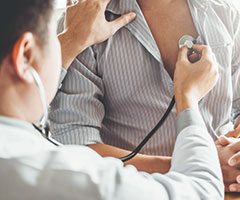Cardiomyopathy
Lee Health: Cardiology Specialists Treating Cardiomyopathy
Lee Health's heart specialists are here to help you understand and treat cardiomyopathy. Lee Health is here to help you understand, manage and treat cardiomyopathy so you can live your best heart-healthy life.
What is cardiomyopathy?
The heart is a muscle. "Cardiomyopathy" means a disease of the heart muscle.
There are several types of cardiomyopathy. In dilated cardiomyopathy, the heart is enlarged and has trouble pumping. In hypertrophic cardiomyopathy, the heart muscle is thickened, often restricting blood flow. In restrictive cardiomyopathy, the walls of the heart are stiff and can't function as well.
Cardiomyopathy can lead to heart failure, heart rhythm problems, and sudden cardiac arrest.
-
Cardiac Critical Care
At the first sign of a heart attack, every second counts. Our emergency cardiac care team is available 24 hours a day at our four adult hospitals.
What are the symptoms of cardiomyopathy?
Patients may have no symptoms in the initial stages of cardiomyopathy. As the disease progresses, symptoms tend to get worse.
Most common symptoms of cardiomyopathy are:
- Shortness of breath
- Swelling in the ankles, feet and legs
- Fatigue
- Irregular heartbeat
- Dizziness or lightheadedness
-
Cardiology - Heart Institute at Bass Road
-
Cardiology - Heart Institute at Cape Coral Hospital
-
Cardiology - Heart Institute at Coconut Point
-
Cardiology - Heart Institute at Medical Plaza One
-
Cardiology - Heart Institute at Sanctuary
-
Cardiology - Heart Institute at Metro Parkway
How is Cardiomyopathy treated?
- Medication. Many medications are available that can help improve symptoms, boost heart function and increase survival.
- Surgery. By removing or destroying part of the thickened heart muscle through surgery, the function of the heart may be substantially improved.
- Alcohol septal ablation for hypertrophic cardiomyopathy. This percutaneous, minimally-invasive treatment is performed by an interventional cardiologist to reduce the obstruction to blood being ejected from the heart; the technique creates a small controlled heart attack, killing the area of heart muscle responsible for the obstruction, and eventually causing it to become less thick.
- Implantable defibrillator If you are at risk of sudden cardiac death, your cardiologist may recommend an implantable defibrillator. Should your heart stop, a shock from the defibrillator can restore your heart's normal rhythm.
- Pacemaker. For some people with cardiomyopathy, the implantation of a pacemaker can help to regulate the rhythm of the heart.
What is Lee Health's approach to heart diseases?
Lee Health is the largest health system in the region. The research we perform here keeps us on the leading edge of treatments for heart diseases.
Who should I contact?
If you have symptoms of cardiomyopathy, contact Lee Health at 239-343-6350. For Pediatric Cardiology, please call our doctors at 239-343-7490.






















































































